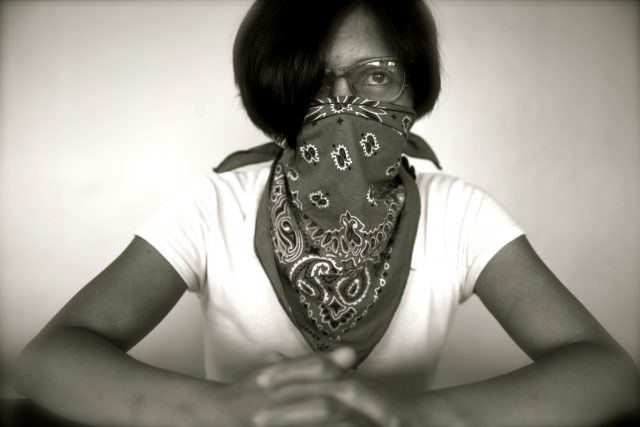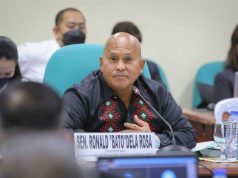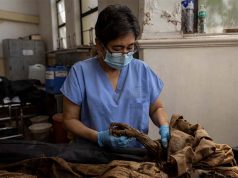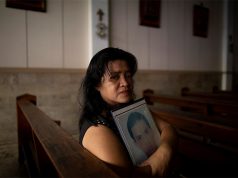This is the first of a series of stories on some — in truth, but a handful — of the families left behind by the thousands of victims of the extrajudicial killings that have marked the war on drugs waged by the government, which also turned one year old with the presidency of Rodrigo Duterte.
MANILA, Philippines — The killings began in June 2016.
A hundred people were rounded up in Brgy. Payatas, Quezon City and eight of them ended up dead.
The murders were mostly committed by motorcycle-riding men garbed in jackets, bonnets, and helmets.
“‘Yun na. Meron pa pong sumunod, sumunod, sumunod, hanggang sa nangyari ‘yung sa asawa ko (That’s when it started. Then another, another, and another followed, until it happened to my husband),” Anita*, 27, recalled.
On the morning of December 6, she left her home to find policemen milling about. She ignored them, pausing only when her mother reported that three people had been killed nearby.
“Na naman (Again)?” Anita wondered but did not find the news particularly disturbing because killings happened at least once a month in Payatas.
“Kahit nga po maraming tao, nangyayari eh (It happens even when there are a lot of people around),” she said.
She went home for a nap until her mother shook her awake and told her Boyet*, her husband, was one of the dead.
Shocked, Anita rushed to the huts where scavengers like her 30-year-old husband took breaks from their work at the vast dumpsite and scoured the streets for someone who could tell her what had happened.
Finally, one of Boyet’s friends gave in and told her the police had supposedly entered the hut where her husband was, tortured Boyet’s friend then shot him dead. Boyet tried to plead for his friend’s life but met the same fate.
“Sabi pa nga nu’ng nakapagkuwento sa akin, nagmakaawa daw po ‘yung asawa ko na ‘Sir, ‘wag Sir kasi maliit pa po ‘yung mga anak ko Sir.’ Pero huli na, eh. Wala na. Wala nang oras. Talagang tinuluyan na siya. Ang tama ng asawa ko puro ulo, anim (The person who told me this said my husband was pleading, saying, ‘Sir, please don’t do it sir, because my children are still young, sir.’ But it was too late. Everything was lost. There was no more time. They killed him. My husband was shot six times in the head),” Anita said.
At the morgue of the East Avenue Medical Center, Anita could barely recognize her husband; his face was so swollen.
The funeral expenses were a burden. Anita collected whatever money Boyet’s relatives from the province could send and knocked on the doors of the city councilors who told her there were no more funds as it was almost Christmas.
“Gusto kong malungkot. Gusto kong mag-iiyak sa tabi. Kaya lang hindi ko magawa kasi para saan ‘di ba? Walang ibang kikilos kundi ako lang (I want to be sad. I want to weep. But I can’t do it because what good will it do? No one else will act except for me),” she said.
“Halos hindi ko na nga alam kung anong mga lakad ko noon na ano, basta sabi pumunta ka sa ganito, sa ganyan, para humingi ka ng tulong. Eh ‘yung papunta naman po namin noon sa City Hall, tinataboy kami. Pag biktima po ng ganu’n. Ayaw po nila kaming bigyan ng papel na kailangan namin… para makalapit ka ulit sa ibang ahensya (I couldn’t even keep track of where I was going. They just told me to go here, go there, and ask for help. And when we went to the City Hall, we were turned away. They do that to victims like us. The refused to give us the papers we needed… so we could go to other agencies),” she added.
She would return home with no money in her pockets, another day wasted.
Her husband’s body went unburied for 17 days. Anita would hold an umbrella over his coffin and her head when it rained. No one came to visit, except for a friend.
Every motorcycle that passed by scared her. Would her three children be next?
Finally, a day before Christmas Eve, someone went to a priest who came and blessed Boyet’s body for the first time. He also gave Anita money to help pay for the burial.
Anita admits her husband used drugs, but believed he had not been using at the time because he had a kidney problem and had been resting from work for three weeks so he wouldn’t have had the money. She said she had told him to stop the vice but he argued that it helped him work.
“Hindi ko na rin inaano, kasi ang importante sa akin, mga anak ko, araw-araw may makain (I didn’t press the matter, because what was important for me was that my children would have something to eat every day),” Anita said.
These days, she does her neighbors’ laundry to earn a living. Fortunately, the Church has helped provide some of their needs, giving school supplies to the kids. Every first and third Saturday of the month, there are also gatherings at the chapel where Anita and other families pray for the souls of the dead and share stories.
She keeps a close eye on her children when they aren’t in school “kasi sa amin hanggang ngayon, meron pang biktima eh. Meron pang nangyayaring binabaril na lang. Kaya natatakot po ako nang ganu’n. Kasi ‘pag may pumutok, agad-agad may patay eh (Until today there are still victims where we live. People just get shot. And that makes me scared. Because once you hear a bang, you know someone’s dead).”
Anita also turns off the TV every time President Rodrigo Duterte appears on the screen.
Yes, he is right to want to end the proliferation of illegal drugs, Anita says. But to kill suspects instantly is wrong. Is there a quota for dead bodies, she muses.
“Buti sana kung hinuli na lang. Makikita pa namin siya at madadalaw pa namin. Makakapagbago pa. Kaysa ‘yung ganyan, hinatulan na lang nila ng ‘Patayin na lang ‘yan’ (It would have been better if they just arrested him. We would still be able to see him and visit him He would be able to change. Rather than what happened; they just sentenced him to death),” Anita said.
*Names have been changed to protect the people’s identity.










